'If, as appears to be the case, India is on way to 'mending fences' with China, and China is equally desirous to 'reset' the relationship, this could be a self-reflexive moment in India's positioning vis-a-vis not just the Dalai Lama, but also the Tibetan issue and China as a whole,' points out China expert Alka Acharya.
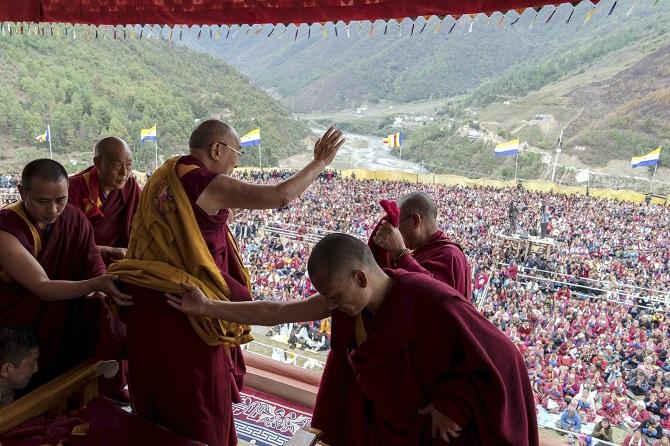
IMAGE: The Dalai Lama during his visit to Arunachal Pradesh in April 2017. His Holiness stopped between Tawang and Bomdila to consecrate the Thupsung Dhargyeling monastery in Dirang and and deliver teachings. Photograph: PTI
The Note
A day before India's new foreign secretary made his first standalone visit to Beijing from February 23-24, 2018, he sent out a note to the Cabinet secretary, requesting him to issue a 'classified circular advisory advising all Ministries/Departments of the Government of India as well as State Governments not to accept any invitation or to participate in the events being organised by the 'Dalai Lama set-up' to commemorate the start of the sixty years of exile of the Dalai Lama in India.'
The Cabinet secretary in turn issued a Circular/Advisory to the 'senior leaders' and 'government functionaries.'
Interestingly, this Circular, as reported in a Indian Express article (external link), said it was 'not desirable' to participate in the events of the 'Tibetan leadership in India. (Emphasis added.)
The newspaper report does not quote the entire Cabinet Circular, but says It refers to the 'events planned for March-end and early April'. The Note from the forreign secretary, however, refers to the 'large public event titled "Thank You India" slated for 1st April,' to which a large number of Indian dignataries would be invited and these was 'likely to be followed up by additional events in Delhi as well as other states of India.'
Two questions came to mind as one read the selections from the MEA note and juxtaposed it with the Circular. Are such Notes usual/normal? Have they been issued in the past as well?
Quite clearly, the 'sensitive' nature of the subject of the Note is neither new nor is the fact unknown that this is a 'core' concern for the Chinese.
Ever since the establishment of the People's Republic of China, there has been no occasion when Beijing's reactions have not been over the top, so to say, whenever there is any move by anycountry, which has implications for the PRC's territorial integrity and sovereignty (most categorical when it involves Taiwan and Tibet) and when they feel that their interests in this regard are affected in any way.
It stands to reason that the government would, in a general way, issue such advisory notes from time to time, when matters of grave importance were involved and it would not be surprising if notes on this specific issue were sent around occasionally by the MEA in the past as well, possibly on the eve of State visits or when some very high profile functions were organised.
The foreign secretary's note had particularly referred to the 'large public event' as also 'additional events'. In the Circular, as reported by the Indian Express article, there does not appear to be any further elaboration regarding the nature of the 'proposed commemorative events' in which there should be no participation.
Prima facie, this would appear to include all categories of events pertaining to the 60th anniversary of the Dalai Lama's arrival in India.
The Directive from the Cabinet Secretary specifically instructs the secretaries and heads of government departments that 'participation in these events should be discouraged' and 'accordingly (you are) requested to ensure appropriate action on the matter.'
More significantly, the foreign secretary's note emphasised that the 'proposed period' (would) be a very sensitive time in the context of India's relations with China.' This was equally stressed in the Circular.
That the message was not lost on Dharamsala emerged in the comment made by Ngodup Dhongchung, the Dalai Lama's representative in Delhi, when he confirmed that the event has been rescheduled and shifted to Dharamsala.
'Some people may be disappointed. But we are guests of India. Indian people have been very generous to us. We understand the compulsions,' Dhongchung said.
Sonam Dagpo, spokesperson for the Central Tibetan Administration in Dharamsala, told the Indian Express: 'India is host to Tibetan refugees. We respect the Indian government's decision. We have no further comments.'
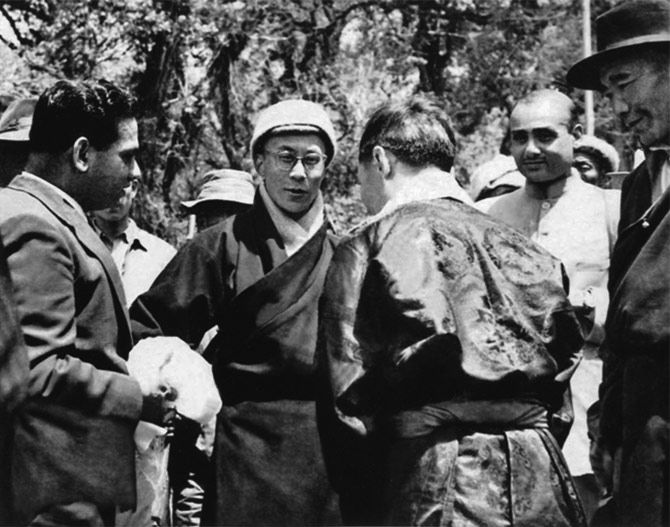
IMAGE: Among the Indian officials who received the Dalai Lama, centre, when he arrived in India in March 1959 was Har Mander Singh, left, the political officer responsible for the Kameng Frontier Division, and P N Menon, second from right, who served as India's consul general in Lhasa, and as intermediary to the Dalai Lama during the 1959 Tibetan uprising. Ambassador Menon's son Shivshankar Menon later became India's foreign secretary and national security adviser. Photograph: Kind courtesy Claude Arpi
Anniversaries are certainly very significant for the Chinese -- and they would be aware of the celebrations being planned by the Tibetan exile community in India. In the backdrop of the developments in the past few years, they would certainly observe New Delhi's handling of the matter.
Undoubtedly, the Note and its fallout would have been duly noted by Beijing and given the reported fact that it 'was sent a day before the Beijing visit of the Foreign Secretary, there seems to be a prima facie case for a quid pro quo having occurred, with China removing its objection to placing Pakistan on the grey list of the FATF (Financial Action Task Force on Money Laundering).
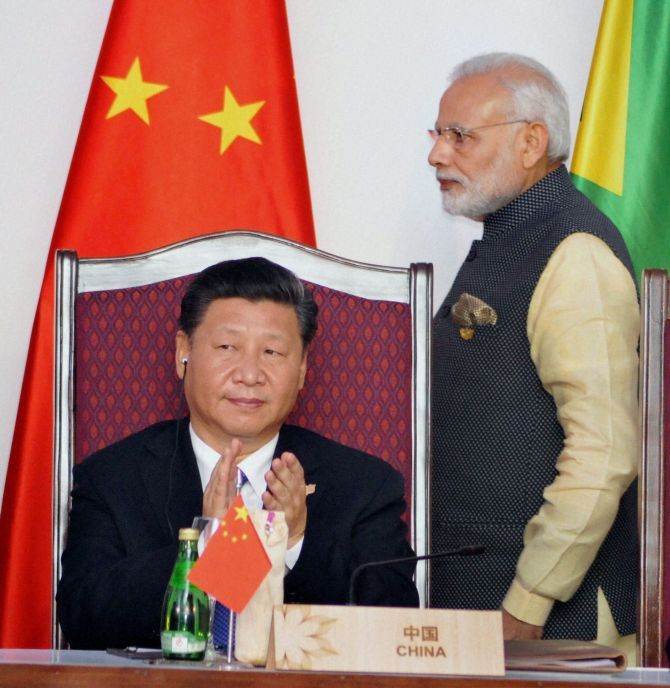
IMAGE: Prime Minister Narendra D Modi and Chinese President Xi Jinping at the BRICS summit in Benaulim, Goa, October 2016. Photograph: PTI Photo
The Context
The official Indian position, as enunciated in the Joint Declaration issued on the occasion of then Chinese president Hu Jintao to India in 2006, stipulates that India has 'recognised the Tibetan Autonomous Region as part of the territory of the People's Republic of China', and that it 'does not allow Tibetans to engage in anti-China political activities in India'. (Emphasis added.)
However, the phrasing provides scope for a degree of ambiguity, within which the government as also various political parties, have often operated.
The Central Tibetan Administration in Dharamsala is registered under the Registrar of Societies Act which enables it to receive foreign funding. While there would be no official sanction or any endorsement of Tibetan activities bearing a 'political' nature, cultural, religious and other non-political activites have been regularly patronised by a wide range of politicians and civil society peronalities.
The Dalai Lama is invariably addressed as 'Your Holiness' at all public events. This is problematic for the Chinese who have employed an amazing array of epithets to describe him, the least offensve of which is 'splittist' and 'dangerous separatist.'
Thus the formal stand on the Tibetan issue and the nature of the relationship with the Dalai Lama is fairly straightforward; the Note/Circular by themselves do not amount to any dramatic shift or change.
What we are looking at is not so much a downgrading of the affairs of the Tibetan exile community, as reverting to the earlier approach of distancing the government from events and activities organised by the Dalai Lama or the Central Tibetan Administration.
The interesting historical footnote here is that as the joint secretary of the East Asia division in the MEA, the current foreign secretary had ensured that there was no government participation in the '50 Years in Exile events' organised in 2009.
In fact, there have been numerous other occasions in the past when the government has taken a step backwards or reconsidered its decision with regard to either hosting specific events or cancelled meetings scheduled with the Dalai Lama. Often to our discomfiture.
Take, for instance, the cancellation of the Dalai Lama's meeting with the BJP president, at the eleventh hour, on the eve of Prime Minister Narendra D Modi's visit to China in 2016.
The question thus arises whether this note and circular indicates that the government is being cautious and circumspect, in view of the strong protests by China over the last few years involving the Dalai Lama's activities and in view of the tensions and strains that had begun to emerge between the two Asian giants.
This formulation would, however, appear to suggest that circumspection was somewhat in abeyance earlier. To some extent, if we look at the various developments over the past few years, there has certainly been a hardening of views on the Tibetan issue, within the strategic community.
Equally, we saw some rethinking taking place within official circles, viz the invitation to Lobsang Sangay -- president, Central Tibetan Administration -- to particiapte in the swearing-in of the Modi government on May 26, 2014.
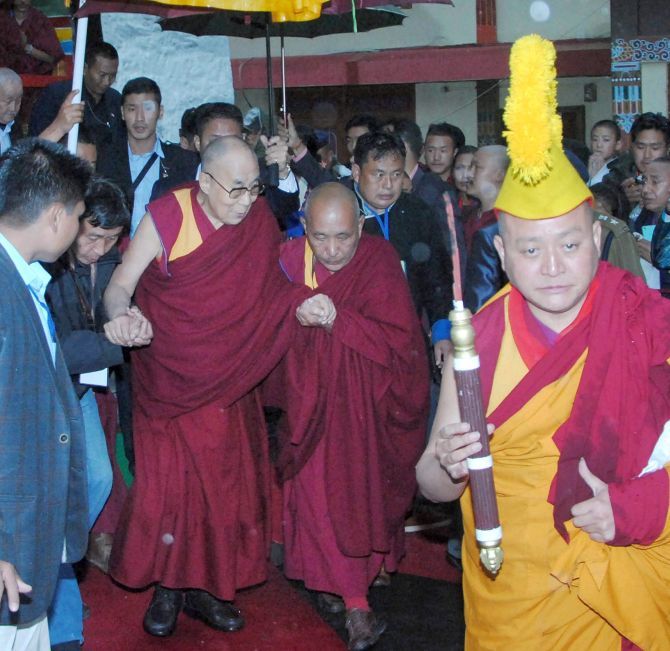
IMAGE: The Dalai Lama arrives at Bomdila in West Kameng district, Arunachal Pradesh, April 4, 2017. Photograph: PTI Photo
It may be useful to recall that since 2010, the Joint Statement issued at the India-China summit meetings ceased to include the customary reference to Tibet as part of China. In fact, even the joint statement issued during Prime Minister Manmohan Singh's visit in 2008 did not mention Tibet, though there was a reference to the one-China policy and India's commitment to oppose any 'activity that is against the one-China principle.'
There is however, no gainsaying the fact that throughout 2016-2017 we witnessed a steady increase in the Dalai Lama's profile within India, which led to angry exchanges with China.
To be sure, the prime minister himself has never met with the Dalai Lama though other political personalities have. Let us not forget that when then President Pranab Mukherjee hosted the Dalai Lama along with other Nobel Prize winners in December 2016, the Indian side had to issue an explanation as regards the the 'non-political' nature of the event.
In October 2016, in a first, the then US ambassador to India, Richard Verma, visited Tawang, described by India as 'routine', which was criticised by the Chinese as 'interference.'
Thereafter, the 17th Karmapa was also given permission to visit Tawang, following a decision by the Cabinet Committee on Security to lift the existing travel restrictions on the Karmapa.
In October 2016, the Dalai Lama was given the go-ahead to visit Arunachal Pradesh for a religious festival in April 2017, inviting a furious objection from China.
It may be recalled that the Dalai Lama had been extended permission to visit Arunachal Pradesh for the first time in 2009 by the Manmohan Singh government. But the visit in 2017 went further when he was welcomed there by the chief minister of the state and the central minister of state of home affairs Kiren Rijuju, which made a qualitative shift as far as the Chinese were concerned.
The Dalai Lama on his part has not hesitated to laud the shedding of India's 'over-cautious' behaviour vis-a-vis China and the Tibetan issue has undoubtedly become embroiled in the politics within Arunachal Pradesh.
Reacting to Beijing's furious reaction during the Dalai Lama's April 2017 visit, the chief minister of the north eastern state declared that Beijing had no right to meddle since India shared a border with Tibet and not China.
And above all, it would be well to recall the diplomatic fiasco that ensued following the Dalai Lama's visit to Mongolia in November 2016. China censured the Mongolian government and demanded an apology from the Mongolian government on pain of losing financial assistance and cancelled bilateral talks.
India did not have the capability to step in and offer to bail the Mongolians out -- and it would certainly be counterproductive to wade into Sino-Mongolian waters. Despite Prime Minister Modi's visit to Mongolia in May 2015 and the extension of a line of credit, subsequent actions on the part of the Mongolian government made it crystal clear who was calling the shots.
Over the past few years, we have been witness to a plateau-ing of the momentum in India-China ties and despite the oft-repeated, rather vacuous homily, that 'both sides should not let differences become disputes', we have regrettably been unable to move forward.
Thankfully, that pointless phrase does not figure in the MEA press release following Foreign Secretary Vijay Gokhale's February visit.
The tripwires generating the tensions are China's consistent 'technical' opposition to the UN Security Council resolution to place (Jaish-e-Mohammed terrorist) Masood Azhar on the UN Terror list; going ahead with the construction of the China-Pakistan Economic Corridor in the territory claimed by India, its veto on the Nuclear Suppliers Group waiver and the dragging of its feet on the issue of India's permanent membership of the UN Security Council. Cumulatively, these have amounted to a blatant lack of 'sensitivity' to India's 'core' concerns.
The general strategic discourse and commentary on China has also acquired rather tense overtones, and it is in that context in which many analysts have sought to justify the use of the 'Tibet card', thus giving some degree of credence to the PRC's accusation.
Some have even gone to the extent -- rather erroneously -- of equating our Pakistan problem with China's Tibet problem. This is not tenable in any sense whatsoever -- and there should be very little doubt that while India and China would conceivably not go to war over Pakistan -- they could certainly do so, over Tibet.
It is hoped that Abba Aban's pronouncement is not headed towards fulfillment: 'History teaches us that men and nations behave wisely once they have exhausted all other alternatives.'
It is clear that both sides have attempted to exert pressure on each other in different ways -- but a fundamental fact emerges with all this fencing -- it would not be possible for either side to secure their respective 'core' interests by being at odds with each other. It has only resulted in a vicious cycle and escalating costs.
The 'core' interests of both countries are now intersecting in a manner that requires not just India and China -- but Pakistan as well -- to be on the same page and work in tandem, however unpalatable it may appear to certain sections of the strategic community on ether side.
The gulf between the perception and the reality on the so-called 'non-negotiables', has to be narrowed for any quid pro quo to be realistically considered -- and this is not beyond the grasp of far sighted and creative diplomacy.
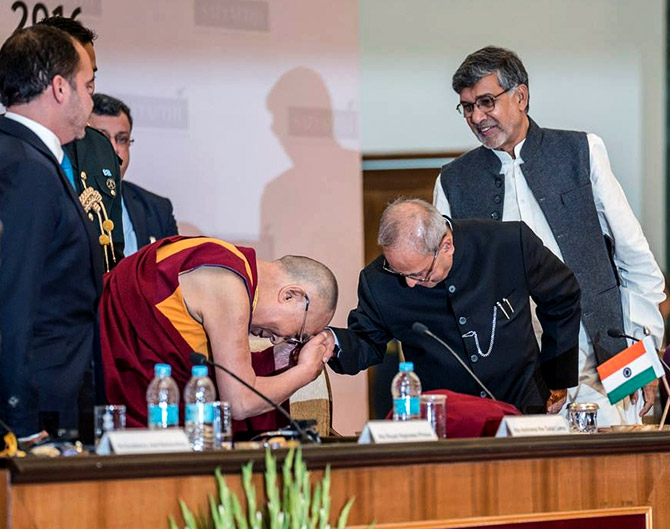
IMAGE: The Dalai Lama greets then President Pranab Mukherjee at the first Laureates and Leaders for Children Summit in Rashtrapati Bhavan, Dece,ber 10, 2016. Photograph: Kind courtesy@Office of Dalai Lama
The Questions
In the backdrop of the past few years, we need to take a long hard look at what we have gained, and stand to gain by playing the so-called 'Tibet card' and ask some tough questions.
In fact, to take a step back, we need to thoroughly re-examine the significance and nature of the Tibetan question and its implications for India-China relations in the present political and and strategic context.
The first set of questions pertain to the Tibet issue. Does our Tibet policy come across as consistent and firm, with regard to both the interests of the Tibetan exile community as well as our own interests?
Very few would contest the fact that it has not taken India anywhere closer to establishing its own credentials and soft power in the Buddhist world.
On the other hand, as has been pointed out by scholars, China has managed to reactivate its Buddhist Association of China, set up in originally in 1953, into a dynamic window of outreach and patronage to Buddhists all over the world.
Have we managed to convince any section of world opinion -- leave aside those significant powers who could make some kind of difference -- to exert pressure on China in this regard?
The most that happens is that foreign governments send delegations to visit Dharamsala or meet the Dalai Lama, but generate no policy impact in those countries. US President Donald J Trump, in fact, announced that he would give zero aid in 2018 to the Tibetans, which is actually a reversal in US policy.
And on the other hand, the bilateral India-China distrust is further fuelled, reducing any reasonable prospects for an Indian role in resolving some of the genuine issues of Tibetan cultural and spiritual autonomy.
Do we adequately factor in the Dalai Lama's communications/messages to Beijing or the dynamics of Sino-Tibetan negotiations?
Does our handling of the Tibetan protests during any State visit by Chinese leaders to India redound to our credit at all?
Is this the best way to further and promote the cause of the Tibetan exile community?
In fact, there are some interesting questions that have been raised with regard to the 'unintended consequences' of India's policy on citizenship for Tibetan refugees.
Secondly, we need to examine the actual efficacy of the so-called 'Tibet card'. Has it resulted in any quid pro quo on the question of our 'core' interests listed above?
Have we managed to convey to the Chinese that we could really queer their pitch with regard to Tibet, a la comments from the highest levels in the army about our readiness to fight a two-front war?
Have we convinced the Chinese of the need to accommodate India's concerns or are we, more often than not, on the backfoot in terms of having to offer explanations about our actions with regard to the Dalai Lama?
Does it appear to have given us any deterrent capabilities or leverage vis-a vis the boundary dispute or has it only increased the pressure points on the borders?
The argument that China can do nothing about India permitting the Dalai Lama to go about his agenda is valid only up to a point, as Dokalam brought home rather dramatically.
For this one so-called card that we appear to hold, the Chinese have six in their hand.
Are we giving serious thought to a post-Dalai Lama scenario and the complications that could emerge, given that Beijing has already announced its readiness to select the next Dalai Lama?
For argument's sake, even if we were to go along with the suggestion that we are displaying spineless pacifism, then it is necessary to answer the question whether we are willing and able to take a call on reversing our official policy.
Typical critiques of this policy demand that India should 'rein in China's dangerous antics in Tibet', but do not answer the question: How?
Would we have the necessary support from not just the Tibetans in India but other major powers as well?
Does it effectively increase our bargaining position in any objective manner?
Harder positions actually border on the reckless, blithely unmindful as to whether we are indeed ready, if push comes to shove. The strategic arguments, in fact, often come across rather in rather cynical manipulative terms and appear at total odds with the lofty spiritual objectives in providing refuge to the exile community.
Leave aside the hawkish writing which reflects an intensified distrust on both sides, what we have been witnessing -- and are likely to witness -- is a hardening stance from the Chinese, than what we saw in the past.
Furthermore, China continues apace with consolidating its infrastructure and military strength along the Tibet border, now extending it to Nepal and of late, also augmenting its infrastructure along its border with Bhutan.
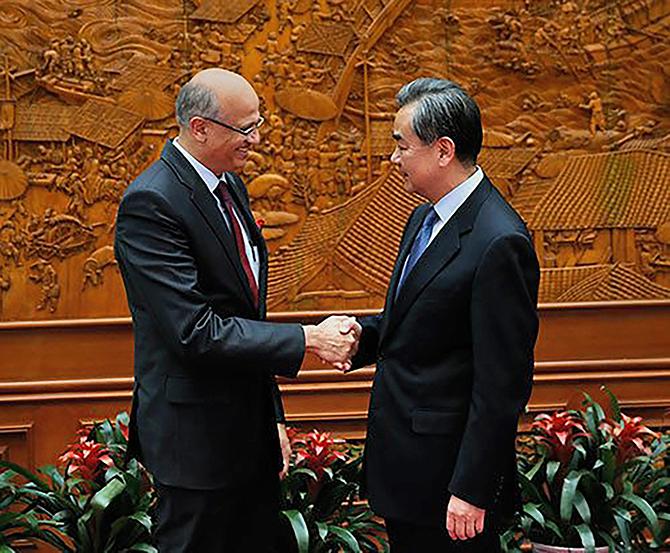
IMAGE: Foreign Secretary Vijay Gokhale with Chinese Foreign Minister Wang Yi in Beijing, February 23, 2018. Photograph: PTI Photo
Re-set of Ties?
The gains to be had from a profitable partnership are conspicuously obvious, especially when we consider the developmental tasks crying out to be done.
Realistically, Chinese investment in India's infrastructure development and manufacturing plans is way ahead of the other possibilities before us and would prove the proverbial shot in the arm for Modi's growth agenda, while China would have access to the truly substantial market in Asia.
India needs China as much as the Chinese need India at this stage of their respective growth and rise. But beyond that, it is possible to make a case that a far more creative intervention can be made by India by considering joint developmental activity in Tibet, with gainful fallouts for all three parties.
Some such possibilities had actually been suggested and it is well worth a shot to take the matter further.
A major 'reset' in the ties had occurred with then prime minister Atal Bihari Vajpayee's visit in 2003 with the setting up of the Political Representatives and the Agreement that followed in 2005. Matters however slackened.
With the coming to power of the National Democratic Alliance under Modi, there had been great expectations once again that the two Asian giants would sort out their differences and open a new -- economically beneficial -- chapter in their relationship.
The last three years have however brought about a new low, culminating in Dokalam. But some key summit meetings are coming up ahead, the Shanghai Cooperation Organisation Summit three months down the road could be a useful opportunity.
The need for circumspection -- as also introspection -- could not be greater -- and if, as appears to be the case, India is on way to 'mending fences' with China, and China is equally desirous to 'reset' the relationship, this could be a self-reflexive moment in India's positioning vis-a-vis not just the Dalai Lama, but also the Tibetan issue and China as a whole.
It bears repeating that situations appear intractable not because we are unable to see the solution; rather, we are unable to see the problem.
Alka Acharya is the Professor, Centre for East Asian Studies, School of International Studies, Jawaharlal Nehru University, New Delhi. She is the former director, Institute of Chinese Studies, Delhi.










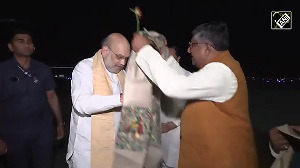
 © 2025
© 2025